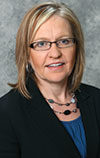Several other states have recognized the impact of developing agricultural leaders to create decisive spokespersons to represent agriculture and rural communities.
If your state offers such a program, I encourage you to research it and consider the possibility of applying.
As I have discussed many times in my previous columns, people rise to leadership roles due to their willingness to serve their industry, and as a result, gain critical skills to serve in leadership roles.
Visiting the nation’s capital
On Feb. 16-23, myself, 28 of my classmates and our coordinating team travelled to the nation’s capital.
Our focus was to gain first-hand experience on the structure and function of the U.S. government, understand current issues and learn more about policy development.
A visit to Washington, D.C. definitely enlightened us on what happens within the Beltway and how it directly impacts our farms, ranches and communities in South Dakota.
An added and unexpected dimension of our trip was the timing of our travels. Our visit landed us in D.C. within two weeks of the looming sequestration and the heightened concerns about government furloughs and even a possible government shutdown.
This left no shortage of discussion and speculation by our guest speakers as they tried to explain what might happen on March 1 or on other major deadlines looming.
It was truly a unique opportunity to hear a “within the circle” analysis of an impact of sequestration or government layoffs.
This better equipped us to come back to South Dakota and be able to share directly with our fellow agriculturalists what was on the horizon.
Even though the issue of sequestration was headline news that week, we continued to focus on our primary mission of gaining a greater understanding of the political process.
We were fortunate to spend a full day receiving first-hand reports of the major policies and priorities of agricultural organizations/agencies presented to us by their lead government affairs specialists or lobbyists, such as the American Banker’s Association, National Cattlemen’s Beef Industry, National Association of Wheat Growers, Farmer Mac, Monsanto, American Farm Bureau Federation, the National Corn Growers, Cargill and our state congressional and Senate aides.
But the most commonly repeated statement of the week from our speakers, and the hottest issue of discussion from within our own group was: “What is the future of the Farm Bill?”
Budget issues were grabbing the headlines, but for us and those representing agricultural organizations, the Farm Bill was one of the top issues.
Unfortunately, we didn’t come home with a clear answer on the future of the Farm Bill (other than the current extension which had already been implemented and expires September 30, 2013), but we were comforted to know that it is top-of-mind for the agricultural organizations that lobby Congress and the Senate.
From the reports we received, it appears much more likely that it will be summer before debate and progress will begin again on the Farm Bill due to the overarching national budget issues.
Policy developed by those in agriculture
As we met with the staffers of agricultural organizations and our congressional representatives, it was comforting to hear them talk so proudly about their interest or connection to agriculture.
I would estimate that 95 percent of them were raised in rural America, several on farms and ranches stretching from Texas to Minnesota, and they truly have a desire to see agriculture thrive and be recognized for its contribution to the economy and feeding our country.
These individuals couldn’t accentuate enough how critical it is that the lines of communication remain open between state, regional and national agricultural organizations, agricultural leaders and producers in efforts to aid in drafting effective policy.
I also believe we should encourage our young people who have agricultural knowledge and hands-on experience to pursue opportunities in agricultural policy at either the state or national level of government.
We need to continue to have people in Washington, D.C. that can relate and understand rural America.
The importance of rural America and its impact on our country was echoed by Secretary of Agriculture Tom Vilsack during his keynote address at the Annual Agricultural Outlook Conference we attended.
“Rural America is the number one place for food production in this country, which makes us a food-secure nation,” Vilsack said.
Dialoguing with the other side
Finally, in an effort to challenge our leadership abilities, we were presented with the task of conducting an on-site visit with a special-interest group representing issues such as environment, water, energy, conservation, human health, animal welfare or general agricultural issues.
Most of these special-interest groups represented polar opposite views from what most in South Dakota agriculture would believe.
It was definitely an eye-opening experience to be challenged on your values, opinions and educational experiences; however, in today’s society, having open discussions with those having opposite viewpoints can be important. We must learn about them just as they must learn about us.
A few short take-home lessons I gained from this experience were:
- Be prepared – Come with the facts (studies, scientific reports, etc.) and focus the presentation on the special-interest groups’ priority issues which differ most from yours. This begins your education process.
- Be willing to listen – Listen to their views and give them time to present their viewpoint and reasoning behind their views.
-
Find common ground – Find common ground on some issues you can agree on (if any), then state that you understand there are also issues or items you will have to agree to disagree on. This provides an open and professional discussion for both parties.


B. Lynn Gordon
Field Specialist
South Dakota State University Extension









